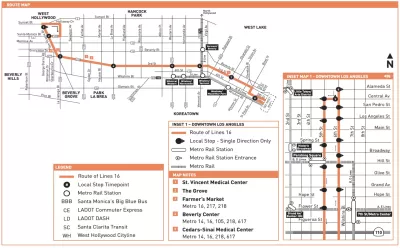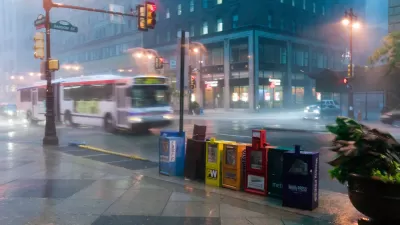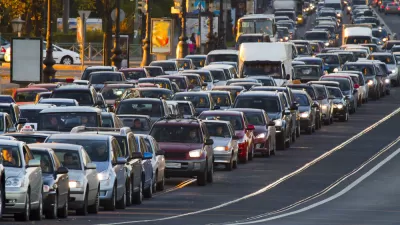Los Angeles’ 16 bus, which cuts across the city on Third Street through some of the city’s densest neighborhoods, will experiment with a new approach to service design.

The Los Angeles County Metropolitan Transportation Authority (Metro) bus system is switching to “headway-based operation” to improve performance along a popular east-west route. The Metro 16 bus will operate without a schedule between 7 am and 5 pm on weekdays.
According to an article by Daniel Martinez for LAist, headway-based operations differ from Metro’s standard timetable bus service design schedule by focusing on the spacing between buses (i.e., headways), rather than a set schedule of departure and arrivals.
Martinez also explains how headway-based operations work in an era of real-time location technology:
Thanks to advances in technology, supervisors will monitor the intervals at departure, in the middle of the line, and at the end of service. Additionally, bus operators will have tablet displays that provide real-time feedback on when their pacing is good, when to slow down to increase the gap between buses, and when to speed up to avoid bunching.
Headway based operations can thus mitigate bus bunching—when several buses can pass in quick succession, leaving a longer-than-planned gap between headways.
“Similar headway based programs had been tried in other large cities like Honolulu, Austin, and Seattle,” according to Martinez, but Metro scrapped its own previous attempt at headway-based operations with the launch of rapid service back in the early 2000s.
FULL STORY: Can Buses Run More Efficiently Without A Schedule? Metro Wants To Test It Out

Trump Administration Could Effectively End Housing Voucher Program
Federal officials are eyeing major cuts to the Section 8 program that helps millions of low-income households pay rent.

Planetizen Federal Action Tracker
A weekly monitor of how Trump’s orders and actions are impacting planners and planning in America.

Ken Jennings Launches Transit Web Series
The Jeopardy champ wants you to ride public transit.

Rebuilding Smarter: How LA County Is Guiding Fire-Ravaged Communities Toward Resilience
Los Angeles County is leading a coordinated effort to help fire-impacted communities rebuild with resilience by providing recovery resources, promoting fire-wise design, and aligning reconstruction with broader sustainability and climate goals.

When Borders Blur: Regional Collaboration in Action
As regional challenges outgrow city boundaries, “When Borders Blur” explores how cross-jurisdictional collaboration can drive smarter, more resilient urban planning, sharing real-world lessons from thriving partnerships across North America.

Philadelphia Is Expanding its Network of Roundabouts
Roundabouts are widely shown to decrease traffic speed, reduce congestion, and improve efficiency.
Urban Design for Planners 1: Software Tools
This six-course series explores essential urban design concepts using open source software and equips planners with the tools they need to participate fully in the urban design process.
Planning for Universal Design
Learn the tools for implementing Universal Design in planning regulations.
Ada County Highway District
Clanton & Associates, Inc.
Jessamine County Fiscal Court
Institute for Housing and Urban Development Studies (IHS)
City of Grandview
Harvard GSD Executive Education
Toledo-Lucas County Plan Commissions
Salt Lake City
NYU Wagner Graduate School of Public Service





























